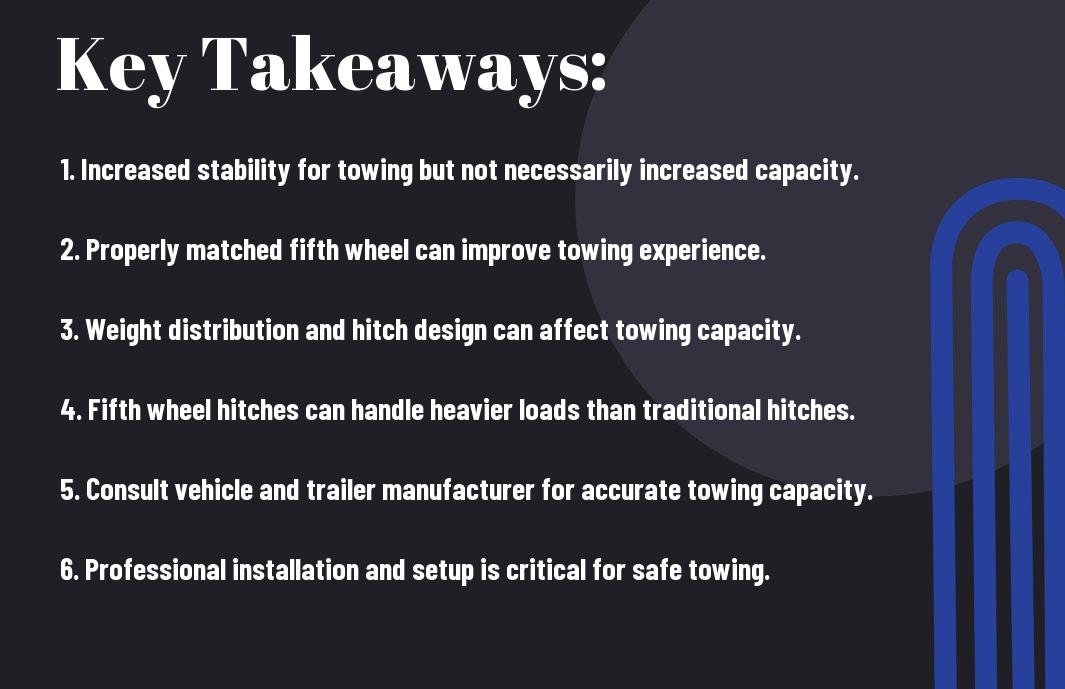Are you considering investing in a fifth wheel for your towing needs? Many people believe that using a fifth wheel can significantly increase your vehicle’s towing capacity. However, there are important factors to consider before making this decision. Understanding the impact of a fifth wheel on your towing capacity is crucial for ensuring the safety of yourself and others on the road. In this blog post, we will explore whether a fifth wheel truly increases your towing capacity, the potential dangers of exceeding your vehicle’s limits, and the benefits of using a fifth wheel for towing.
Key Takeaways:
- A fifth wheel hitch does not directly increase towing capacity. While a fifth wheel hitch can provide a more stable towing experience, it does not increase the vehicle’s towing capacity.
- The towing capacity is determined by the vehicle’s components and design. This includes the engine, transmission, suspension, and frame strength.
- Using a fifth wheel hitch can improve towing stability and control. It distributes the weight of the trailer more evenly, reducing swaying and improving handling.
- Proper installation and setup are crucial for safe towing with a fifth wheel hitch. It is important to follow the manufacturer’s guidelines and ensure the hitch is installed and adjusted correctly.
- Upgrading to a fifth wheel hitch may require modifications to the towing vehicle. This can include installing a mounting system and reinforcing the truck bed for proper attachment.
- Consulting with a professional is recommended when considering a fifth wheel hitch. A professional can assess the vehicle’s capabilities and provide guidance on the best hitch for the specific towing needs.
- It is important to adhere to the vehicle’s recommended towing capacity. Exceeding the towing capacity can compromise safety and put additional strain on the vehicle’s components.

Fundamentals of Fifth Wheel Towing
Assuming you’re considering towing a heavy load with a fifth wheel, it’s important to understand the fundamentals of this towing method. Fifth wheel hitches are designed to increase the stability of your tow vehicle and provide a greater weight capacity compared to conventional trailer hitches. To ensure safe and efficient towing, it’s crucial to grasp the definition, function, and comparison of fifth wheel towing.
Definition and Function
The fifth wheel hitch is a specialized coupling device that mounts in the bed of a pickup truck, providing a pivot point closer to the vehicle’s rear axle. This allows for a more stable connection with the trailer, distributing weight more evenly and reducing the sway often experienced with bumper towing. The function of the fifth wheel hitch is to provide a secure and controlled towing experience, especially when hauling heavy loads.
Comparison with Other Towing Methods
When comparing fifth wheel towing to other methods such as bumper towing or gooseneck towing, there are several important distinctions to consider. Below is a comparison table outlining the key differences:
Comparison of Towing Methods
| Towing Method | Key Differences |
| Bumper Towing | Less stability and weight capacity compared to fifth wheel towing |
| Gooseneck Towing | Similar stability but different hitch configuration compared to fifth wheel towing |
When comparing fifth wheel towing to other methods, it’s important to note that a fifth wheel provides greater stability and weight capacity compared to bumper towing, while offering similar stability but a different hitch configuration compared to gooseneck towing. Understanding these differences can help you make an informed decision when choosing the right towing method for your specific needs.
Factors Affecting Towing Capacity
Keep in mind that several factors affect the towing capacity of your vehicle. Understanding these factors is crucial in determining whether a fifth wheel will increase your towing capacity or not. Here are some key factors to consider:
- Vehicle Specifications: Your vehicle’s make, model, and engine capabilities will play a crucial role in determining its towing capacity. Make sure you understand the towing capacity as specified by the manufacturer for your specific vehicle.
- Trailer Weight: The weight of the trailer you intend to tow is an important factor to consider. This includes not just the weight of the trailer itself, but also the weight of any cargo or passengers inside.
- Transmission and Axle Ratio: The type of transmission and axle ratio in your vehicle can also impact its towing capacity. Vehicles with higher gear ratios and stronger transmissions are often capable of towing heavier loads.
After considering these factors, you can better assess whether a fifth wheel will increase your towing capacity or if you need to make other adjustments.
Vehicle Specifications
When it comes to vehicle specifications, it’s important to understand the towing capacity as specified by the manufacturer for your specific vehicle. This includes the make, model, year, and any optional towing packages that may have been added. Additionally, you should consider the engine size and type, as well as the vehicle’s suspension and braking capabilities. All of these factors will ultimately determine your vehicle’s towing capacity and whether a fifth wheel will increase it.
Fifth Wheel Specifications and Adjustments
When considering the impact of a fifth wheel on your towing capacity, it’s essential to understand the fifth wheel specifications and adjustments that may be required. This includes understanding the weight and distribution of the fifth wheel hitch, as well as any adjustments that may need to be made to your vehicle’s suspension and braking systems to accommodate the fifth wheel. Failure to make these adjustments can not only impact your towing capacity but also pose a safety risk on the road.
Advantages and Limitations
Your decision to use a fifth wheel for towing can offer several advantages as well as some limitations to consider. Understanding these can help you make an informed decision when choosing the right towing setup for your needs.
Increased Stability and Safety
When using a fifth wheel for towing, you can expect increased stability and safety compared to other types of hitches. The design of a fifth wheel places the hitch point in the bed of the truck, which can result in a more secure connection between the trailer and the towing vehicle. This can lead to less swaying and better handling while on the road, especially when driving at higher speeds or in challenging weather conditions. Additionally, the weight distribution of a fifth wheel can provide improved braking control and overall safety when towing heavy loads.
Considerations and Possible Trade-offs
While a fifth wheel can offer increased stability and safety, it’s important to consider some potential limitations and trade-offs. One consideration is the reduced maneuverability when using a fifth wheel, especially in tight spaces or when backing up. The design of the hitch can limit the range of motion for sharp turns, requiring more planning and caution when navigating certain areas. Additionally, the installation of a fifth wheel hitch in the bed of your truck can limit the available cargo space and may require modifications to the vehicle. It’s essential to weigh these potential trade-offs against the benefits to determine if a fifth wheel is the right choice for your towing needs.
Enhancing Towing Performance
Despite the common belief that adding a fifth wheel can automatically increase your towing capacity, the actual impact on towing performance is more nuanced. A fifth wheel can indeed enhance your towing capabilities, but there are several factors to consider in order to maximize the benefits.
Choosing the Right Fifth Wheel
When it comes to enhancing your towing capacity with a fifth wheel, it’s essential to select the right one for your specific vehicle and towing needs. Consider factors such as the weight rating, design, and compatibility with your truck. Additionally, choosing a fifth wheel with a reinforced hitch and sturdy construction will ensure a safer and more efficient towing experience. Keep in mind that a higher quality fifth wheel may come with a higher price tag, but the benefits in terms of towing capacity and overall performance are worth the investment.
Tips for Maximizing Towing Capacity
To maximize your towing capacity with a fifth wheel, there are several key tips to keep in mind. First and foremost, be sure to properly distribute the weight of the load in the trailer to avoid overloading your truck. Additionally, investing in quality tires and brakes for both your truck and the fifth wheel is crucial for safe and efficient towing. Furthermore, regular maintenance and inspections of all towing components, including the hitch and suspension, are essential to ensure optimal performance. Recognizing and adhering to your vehicle’s specific towing capacity is the most important factor in maximizing your fifth wheel’s potential while ensuring safety on the road.
Conclusion
Upon reflecting on the question of whether a fifth wheel increases towing capacity, it is clear that adding a fifth wheel to your towing setup can indeed boost your towing capacity. The placement of the hitch point directly over the rear axle of the tow vehicle leads to a more stable and controlled towing experience, allowing you to safely tow heavier loads. However, it is important to note that simply adding a fifth wheel hitch does not automatically increase your towing capacity. You must also take into account the GVWR and towing capacity of your specific vehicle to ensure that you are operating within safe limits. As always, it is crucial to consult your vehicle’s manual and a professional before making any modifications to your towing setup.
FAQ
Q: Does a fifth wheel increase towing capacity?
A: Yes, a fifth wheel hitch can increase towing capacity compared to a traditional bumper pull hitch. This is because the hitch point of a fifth wheel is directly over the rear axle of the tow vehicle, providing better weight distribution and stability.
Q: How much can a fifth wheel increase towing capacity?
A: The amount of increase in towing capacity with a fifth wheel hitch depends on the specific towing setup and the capabilities of the tow vehicle. In general, a fifth wheel hitch can increase towing capacity by several thousands of pounds, allowing for larger and heavier trailers to be towed.
Q: What types of vehicles can use a fifth wheel hitch?
A: Fifth wheel hitches are commonly used with pickup trucks, as their design and towing capabilities make them well-suited for towing trailers with this type of hitch. Some larger SUVs and full-size vans may also be compatible with a fifth wheel hitch, but it is important to consult the vehicle’s towing capacity and specifications before installation.
Q: Do I need a special bed in my truck for a fifth wheel hitch?
A: Yes, a fifth wheel hitch requires a special mounting system that is installed in the bed of the truck. This typically involves removing a section of the truck bed and installing the hitch mounting rails. It is important to ensure that the truck bed is compatible with the specific fifth wheel hitch being used, as not all trucks are equipped to accommodate this type of hitch.
Q: Are there any downsides to using a fifth wheel hitch?
A: While a fifth wheel hitch offers increased towing capacity and better stability, there are some potential downsides to consider. These hitches are typically heavier and more expensive than traditional bumper pull hitches. Additionally, they require a dedicated hitch mounting system in the truck bed, which may limit the use of the bed for other purposes when the hitch is installed.
